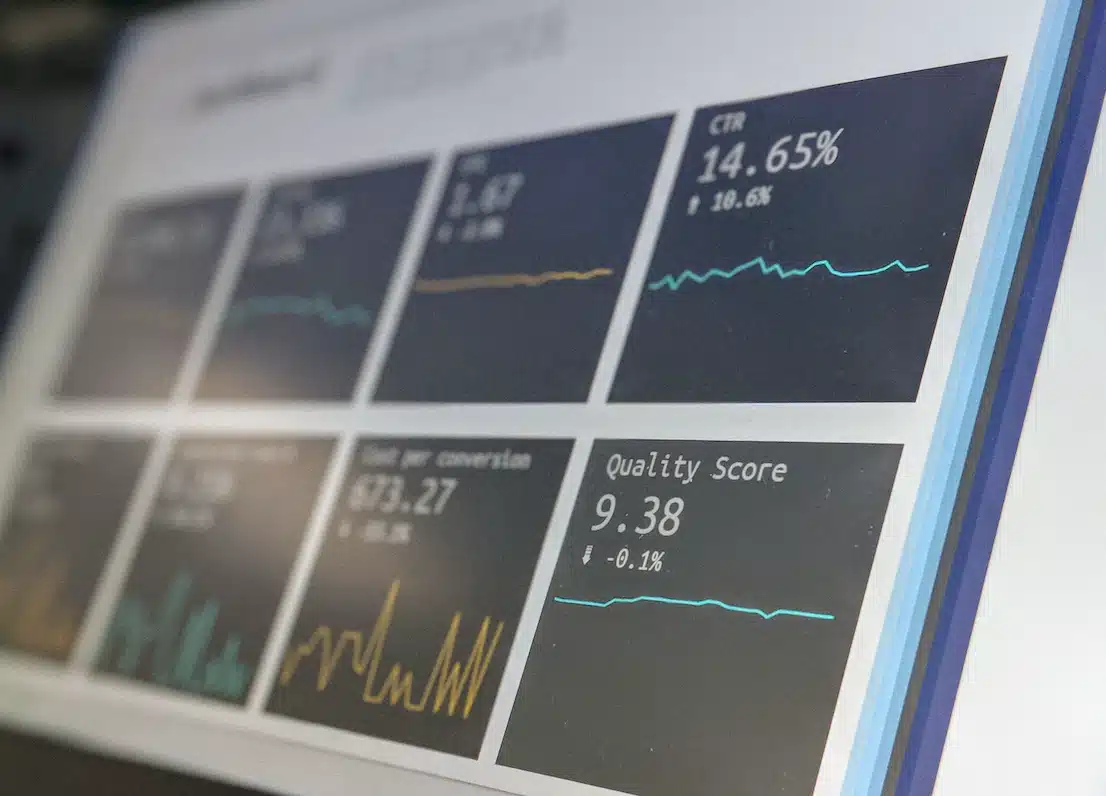Role of Artificial Intelligence in Finance
Artificial Intelligence in Finance has become increasingly commonplace in recent years. As companies look for ways to maximize efficiency and reduce costs. Artificial Intelligence can now automatically execute transactions, analyze data, and spot trends quickly, allowing firms to make more precise decisions.
AI also increases the accuracy of trades, helping companies minimize losses due to human error. Artificial Intelligence in finance is a powerful tool revolutionizing the industry; it’s easy to see why so many firms invest heavily in AI technology.
What Is AI?
Before we dive into Artificial Intelligence in finance, let’s first understand what AI is. Artificial intelligence (AI) is a branch of computer science that creates intelligent machines to think and work like humans. Artificial Intelligence research examines how to design computers capable of intelligent behavior.

There are many different approaches to putting AI applications into action, including the following:
- Machine learning: The process involves teaching computers to learn without having to be explicitly programmed.
- Natural language processing: In this process, computers learn to understand human language and respond accordingly.
- Robotics: Using robots to perform tasks humans find difficult or impossible.
AI is an associative field, drawing on ideas from computer science, mathematics, psychology, and other areas. Its application can be seen in a variety of sizes, including the following:
- Gaming: AI can be used to create intelligent opponents for games such as chess and Go.
- Finance: AI is used in various financial applications, including stock market analysis and fraud detection.
- Biology: AI techniques are used for protein structure prediction and drug design tasks.
Artificial intelligence is a fascinating and quickly developing field that has the potential to revolutionize a wide variety of businesses.
How is Artificial Intelligence in Finance Being Used?
Undoubtedly, artificial intelligence (AI) is gradually changing the finance sector. Artificial Intelligence in finance can increase client experience, growth, and competition in retail banking and investment management. Here are a few examples of how Artificial Intelligence in finance works today.
- In retail banking, AI is being used to provide more personalized service to customers through chatbots and natural language processing. This technology can answer common customer queries, recommend products and services, and provide tailored advice.
- In investment management, AI develops and implements more sophisticated trading strategies. AI-powered software can analyze vast amounts of data to identify trends and predict future market movements. An informed investment decision can be made using this information.
- Artificial Intelligence in finance is also used to detect and prevent fraud in the finance sector. By analyzing transaction data, AI-enabled systems can flag suspicious activity and help to protect organizations from financial loss.
These are just a few examples of how AI is transforming finance. As artificial intelligence technology continues to evolve, we can expect to see even more innovative applications in the years to come.
The Advantages of Using Artificial Intelligence in Finance
Investment banks and hedge funds use AI to make better decisions about where to invest their money. Retail investors are using AI-powered financial apps to manage their portfolios. Here are some of the advantages of using Artificial Intelligence in finance:
Automating Risk Management
One of the primary ways in which Artificial intelligence in finance is used is to automate risk management. By leveraging data-driven models and algorithms, financial institutions can accurately identify and mitigate risks associated with investments or other transactions.
This could help people make better decisions, leading to higher profits and smoother operations.
AI can also help financial institutions detect fraud more quickly and accurately, reducing losses due to fraudulent activity. AI-powered systems can spot fraudulent behavior faster than human analysts, allowing firms to respond quicker and reduce losses.
Improving Customer Service
Another significant benefit of using Artificial intelligence in finance is improved customer service. AI-powered chatbots can give customers faster responses to inquiries or complaints without needing manual customer service staff.
Additionally, some banks are using AI-powered voice assistants as a way for customers to interact with their banking services daily. This could increase customer satisfaction and bank cost savings due to reduced staffing needs.
AI is already impacting finance, and its use will only increase over time. Financial organizations can use data-based models and algorithms to automate risk management procedures.
Additionally, it enhances customer service and is much less expensive than conventional approaches. So it’s evident that AI has a promising future in the financial sector. One that could have enormous advantages for both consumers and corporations!
Monitoring, Detecting, and Preventing Fraud
Artificial Intelligence in finance is revolutionizing how fraud detection, management, and prevention are approached in the finance industry. AI technology can collect and analyze massive amounts of data to detect suspicious movements and financial activities as soon as they happen, allowing companies to take quick action if fraud is suspected.
These networks can become more competent with each passing day thanks to Artificial Intelligence algorithms, resulting in more efficient early detection methods and improved fraud prevention strategies. Artificial Intelligence will significantly impact the world of finance and its safety, leading the way toward a future where we’ll have better protection from fraudulent transactions.
AI in Finance Industry
By enabling banks to detect fraud faster, traders capitalize on trading opportunities faster, and asset managers make more accurate investment decisions. Undoubtedly, Artificial Intelligence in finance will continue playing an increasingly important role.

Thus, those who wish to stay ahead should learn about this fantastic technology today to avoid missing future opportunities!
AI in Banking
Most banks use some form of AI technology already to help streamline their operations. For instance, many banks use chatbots on their websites to answer customer questions quickly and accurately. Chatbots are powered by natural language processing (NLP) technology, enabling them to understand language like humans.
Machine learning algorithms are also helping banks spot fraud faster by studying client transactions faster than humans can. This helps ensure that customers’ accounts are safe and secure while improving the customer experience.
AI in Investment Management
AI is also making waves in the world of investment management. Many hedge funds and asset managers now utilize AI technology to help analyze market data and make more informed investment decisions.
Machine learning algorithms can find market data trends like price fluctuations or stock correlations, giving investment mana
AI in Trading
Traders can utilize advanced AI algorithms to execute deals faster than humans can imagine. Intelligent traders who employ this new technology can take advantage of trading opportunities faster to earn more.
Some traders employ deep learning to construct market prediction models that are more accurate than previous approaches.
What are the Challenges of Artificial Intelligence in Finance?
Artificial intelligence in finance has become increasingly popular. While it can be highly beneficial, some challenges come with using AI. In this blog post, let’s take a look at what some of those challenges are.
Data Quality
AI relies on data to make decisions and predictions. If the data is not accurate or up to date, then it can lead to inaccurate results and outcomes. Before utilizing AI-driven systems or solutions, financial companies must guarantee their data is fresh and reliable.
Regulations & Compliance
One of the main challenges of using Artificial Intelligence in finance is staying compliant with regulations. In some jurisdictions, artificial intelligence (AI) products and services may be subject to additional financial compliance requirements.
Understanding all applicable laws and rules is essential before implementing any AI into your operations. It will help you avoid potential legal issues down the road.
Complexity of Systems
AI systems can be incredibly complex and challenging to manage. These systems take time and effort to set up and maintain, so newcomers may have a high learning curve. If the system breaks or needs updating, numerous businesses may need a lot of resources and experience.
Even though using artificial intelligence in finance has some problems. Businesses continue to rely on it because of its insights into consumer behavior and market shifts.
With proper planning and preparation, businesses can use AI correctly while adhering to all applicable regulations and laws. They can take advantage of AI’s benefits without any significant issues.
Artificial Intelligence in Finance: Future Prospects
Artificial Intelligence (AI) is rising in the financial industry, and it looks like it’s here to stay. AI can be used for a wide range of applications in finance, from algorithmic trading to fraud detection. By providing more accurate and timely data analysis, AI systems can help institutions make better decisions and provide a competitive edge.
The possibilities when it comes to Artificial Intelligence in Finance are virtually endless; with its potential to automate manual processes and uncover previously hidden insights through machine learning, the future of AI in finance looks very promising indeed.
Conclusion: Artificial Intelligence in Finance
Artificial intelligence in finance has become an essential tool for businesses in this industry. Benefits include improved data analysis and less money spent on human labor for customer care and fraud prevention.
AI technology has a lot of benefits, such as making decisions more quickly and accurately and saving money on labor costs. This trend will undoubtedly spread as businesses seek new ways to remain competitive in the current market.







